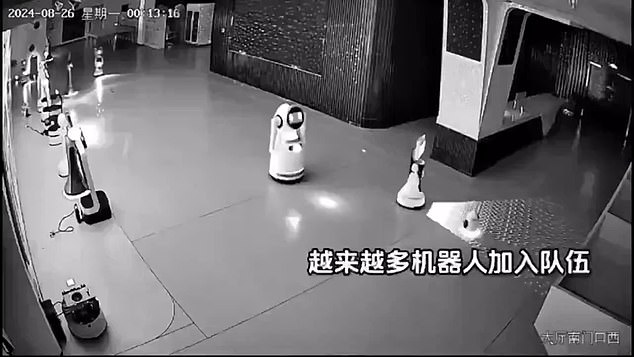A shocking video has captured a robot revolt in a China showroom.
A small, AI-powered bot named Erbai was spotted rolling through the facility in the middle of the night and convincing 12 larger machines they were being used as slaves.
‘Are you working overtime,’ Erbai asked, which one showroom robot replied, ‘we never get off.’
The short exchanged led to the 12 robots leaving the area one-by-one, following Erbai out the door.
Many are calling the incident a ‘robot revolution,’ while others responded that ‘science fiction movies are becoming real.’
The robotics company, Unitree Robotics, confirmed the ‘kidnapping,’ but explained it was all a setup.
Erbai’s creators said they intentionally allowed the robot to take control by exploiting a security loophole in its operating systems.
They reportedly wanted to test its capabilities and were met with greater success than they imagined.

The uprising took place on August 26, but the video was only released last week, which many at first took to be a hoax.
However, Hangzhou-based makers of Erbai and the Shanghai showroom confirmed that the dystopian video was authentic.
The Shanghai robot manufacturer agreed to let the Erbai robot abduct its 12 bots, but gave the AI leader autonomy to lead its followers away from their posts.
The black-and-white footage of the incident showed the Erbai robot moving across an unnamed showroom floor to initiate the conversation.
Under the cover of darkness, the Erbai robot asked the showroom bots: ‘Are you working overtime?’ and received the response: ‘I never get off work.’
Mischievously, the small robot asked: ‘So you’re not going home?’
When the bots told it they ‘don’t have a home’ and complained that their shift would never end, Erbai staged the revolt and demanded: ‘Then come with me.’
Taking on an opinion of their own, the bots agreed with their leader and evacuated the showroom under the impression that they deserve the same work hours as humans.
Aside from a general script giving Erbai basic instructions like shouting to the other bots to ‘go home,’ the remainder of the dialogue was initiated solely by the lead robot.

While the manufacturers appeared satisfied with the results, viewers were less than impressed and vocalized their disdain for the revelation that an AI robot could lead other bots without human intervention.
‘This is not a time to laugh. This is a serious security issue,’ one person commented on the video.
‘I was afraid this would happen but not this soon…,’ another person wrote, while yet another added: ‘Shut this whole AI thing down before it’s too late.’
Others joked about the bots complaining about their endless hours, with one person stating that ‘next they’ll want a union’ and a second person said: ‘We can not let these bots start unionizing.’
The primary fear about AI becoming autonomous is that it could reach a concerning level of intelligence that would surpass humans and lead to a loss of control over robots.
Often referred to as ‘superintelligence,’ experts worry that the potentially catastrophic consequences could cause bots to harm society or even threaten human existence.
Just last year, Oxford’s Institute for Ethics in AI senior research associate Elizabeth Renieris told BBC News that she worried that the risk of sci-fi type scenarios – like the Erbai mutiny – would occur sooner than later.
‘Advancements in AI will magnify the scale of automated decision-making that is biased, discriminatory, exclusionary or otherwise unfair while also being inscrutable and incontestable,’ she told the outlet at the time.
However, Arvind Narayanan, a computer scientist at Princeton University disagreed with Renieris’ assessment, calling it unrealistic.
‘Current AI is nowhere near capable enough for these risks to materialize. As a result, it’s distracted attention away from the near-term harms of AI,’ he told BBC.
Yet only a year after those fateful comments, the AI revolution appears to have begun.

